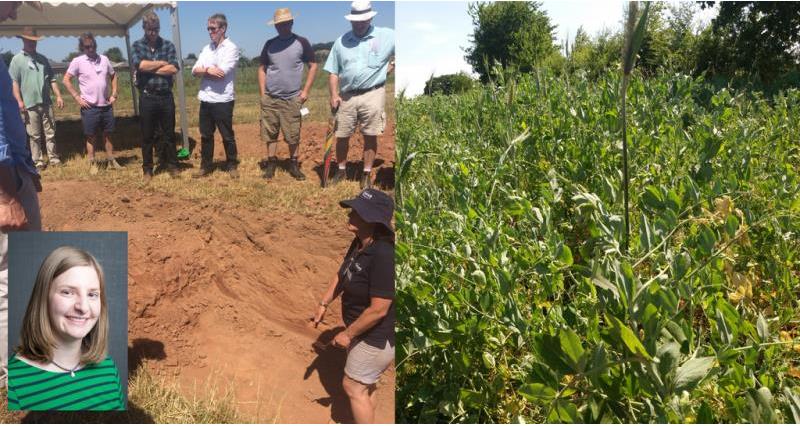She writes:
Head of farming systems research at NIAB, Elizabeth Stockdale's key message was getting to know your soils. If the chemistry and physics of the soil are right, this will lead to biological benefits.
Second to speak was Joel Williams, who covered plant diversity and soil health. He stated that having a variety of root exudates will encourage microbial recruitment. Plants require different microbes at different stages of their life, therefore a larger amount of root exudates will encourage more microbes.
He states that intercropping and having a variation of root exudates will bring different pH levels in the soil. Intercropping balances out pH levels and encourages diversity within the soil. Fungal activity is another way to assess soil health he explains, and the importance of collaboration of micro-organisms working together to unlock nutrients must not be over-looked. Traditionally we have focused too heavily on competition of organism survival – it was fascinating to look at soil health from a more collaborative perspective.
Joel also spoke about the Organic Research Centre DIVERSify project look at designing plant teams for ecosystem resilience and agricultural sustainability. The website gives growers the opportunity to find out which plant teams would work growing together.
An example of this we saw, was triticale and peas growing together. Triticale was used to scaffold the pea crop and allow it to hold its structure. The peas remained standing however they were not competing with the triticale. This is extremely beneficial as there is a threat that if peas lodge, the yields can be reduced by 15-20%. Mark supplies his peas to Hodmedods, who source British beans and pulses and have won many awards, such as the BBC Best Food Producer 2017 and 7 Great Taste awards.
No tillage was another beneficial way of reduce fungal damage, however Mark did admit he had to plough even though he knew it was ‘naughty’, it is a necessity for him as perennial weeds are a challenge on his farm.
Mark Lea spoke extremely passionately about his farm and that his family had been farming the land for 100 years, but for the last 18 years has farmed organically. He also has a small herd of Hereford Pedigree cattle and has recently become involved with sheep to bring organic matter into the rotation, but he mentioned that he still has a lot to learn!
In the afternoon we split into groups and went around Mark's farm. There were five key stations; soils, wheat trials, variety tasting, green waste and plant teams.
I learnt that deep soils are mineral rich, and crops which have access to those minerals perform better. Earthworm channels are extremely important, as they can provide gas transmission, water movement and the worm casts for nutrients which will in turn benefit crops.
The wheat variety trials provided a comparison between modern and older varieties. The in field trials provided insight into scalability and potential threats there were to the variety.
Mark mentioned that green waste business creates 5,000-6,000 tonnes each year. It’s a fantastic source of organic matter for his farm but the process is lengthy and has its own challenges. Contamination of plastic is a huge problem for Mark and costly, as the best way to remove it is by hand. Mark has made significant investment into this enterprise, both in terms of labour, knowledge and infrastructure but it has paid off and Mark sees huge benefits in his soil health from it. A future concern of his is that stricter regulations will gradually phase out this important source.
Kimberly Bell from the Small Foods Bakery prepared an amazing spread of food ranging from quinoa salads to frangipani with orange marmalade. She used some of the crops which were demonstrated in the field. Kimberly spoke passionately before lunch about having a relationship with the food she cooks with and the importance of understanding the roots of what you eat. It was refreshing to see a chef so engaged with farming.
